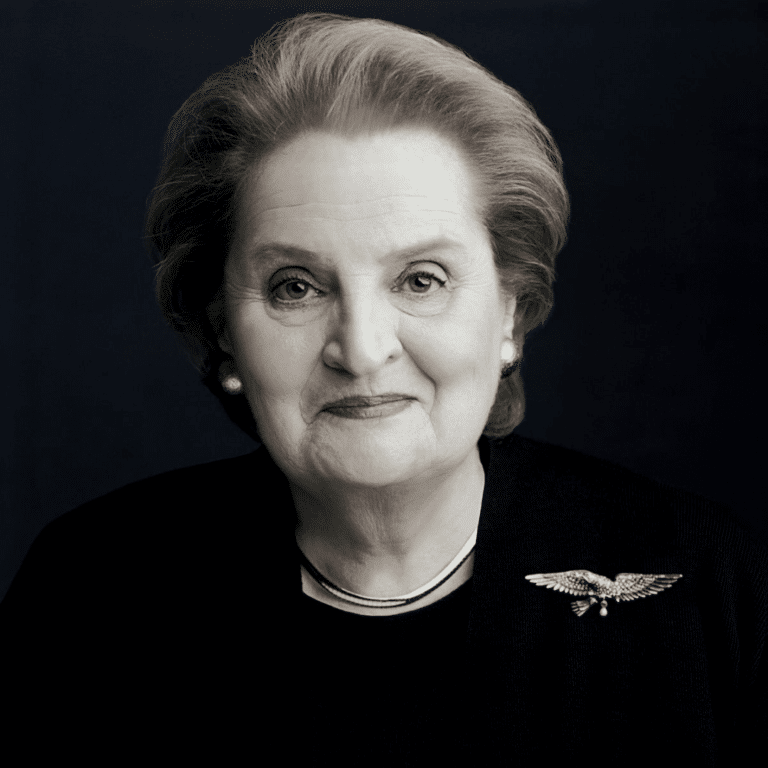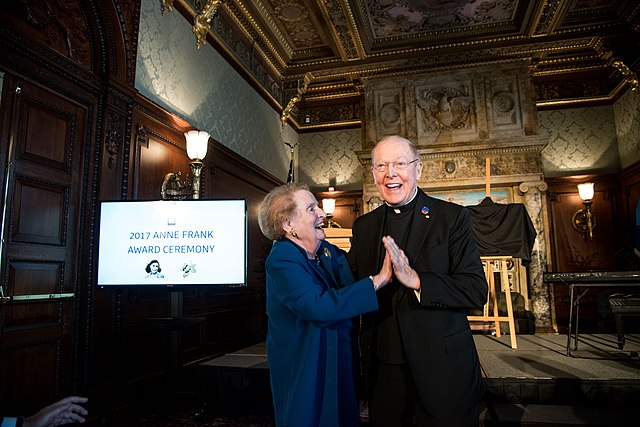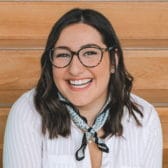
“It’s one thing to find out you’re Jewish… but another to find out that relatives had died in concentration camps. That was a stunning shock.”
Madeleine Albright first learned of her Jewish identity when she was 59, two weeks before being sworn in as the first female Secretary of State in U.S. history.
“It was a complicated family story,” she said in an interview.
Investigations by the Washington Post revealed that, although Albright was raised Catholic, her parents were born Jewish. She also discovered that 26 of her family members, including three grandparents, had been murdered in the Holocaust.
Madeleine Albright was born Marie Jana Korbelova in Prague on May 15, 1937, the oldest of three children of Josef and Anna (Speeglova) Korbel. In 1937, Josef Korbel was serving as a press-attaché at the Czechoslovak Embassy in Belgrade. He worked for Czechoslovakia’s first democratic president, Tomas Masaryk, who retired in 1935, and his successor, Edvard Benes.
Hitler’s annexation of the Sudetenland, and his later invasion of Czechoslovakia in 1939, forced Benes to flee to London. After 10 days in hiding, Korbel, targeted for execution by the Nazis, followed with his family, and worked for the Benes government-in-exile from Britain.
In 1941, Josef and Anna converted from Judaism to Catholicism, according to Albright’s 2003 memoir, “Madam Secretary.”
“They had their children baptized, observed Catholic rites and holidays and, to preserve their assumed identities and possibly their lives, fabricated a family history of Christian memories,” the New York Times reported.
“My parents talked about how they met, and how they were high school sweethearts,” Albright said. “They talked about getting ready for various holidays, for Easter and Christmas.” She recalled being “a very serious Catholic” who loved the Virgin Mary and “played a priest — I was already playing male roles.”
After the fall of the Nazis, the family briefly returned home, but quickly fled again following a Czech Communist coup. Her family immigrated from the United Kingdom on the SS America in 1948, and arrived at Ellis Island in New York Harbor.

Not unlike some other Holocaust refugees who hid their identity, Albright’s parents likely felt it was safer to remain Christians even after they were granted asylum in the United States. According to her, they never told their daughter the full story.
“She says she was raised as a Roman Catholic and was never told by her parents or anyone else that family members had perished in the Holocaust,” the Washington Post reported in 1997.
“She says she has no independent knowledge of the evidence about her family’s connection with that tragedy – the records showing the family’s Jewish origins; the memories of family friends that Albright’s parents converted to Catholicism around the time of World War II; records and other information indicating that Albright’s relatives were exterminated at Auschwitz and other Nazi camps.”
When Albright’s Jewish identity was revealed, only days before being sworn in as Secretary of State, she feared it might cost her job.
“I thought… I’m gonna be fired because they’re going to think that I lied. And I had not lied,” she said in 2012.
I love the holidays with my family. Best wishes to yours! @AliceAlbright @KatieAlbrightSF @DavidBowes12 pic.twitter.com/otR0xEbA1p
— Madeleine Albright (@madeleine) December 27, 2013
Albright also spoke about how proud her parents would have been of her achievements.
”People ask me how would my parents feel today?” she told the New York Times shortly after being sworn in as Secretary of State. ”And I say: my parents are looking down and feeling incredibly proud of the achievement of their daughter and proud of this country of great tolerance that allowed a two-time refugee to serve as the senior member of the Cabinet.”
”On the other hand, this is also a very sad day,” she said softly, referring to what she had learned about her family’s history. “It is that duality I will have to live with for the rest of my life.”
“I think my father and mother were the bravest people alive,” she added. They dealt with the most difficult decision anyone could make. I am incredibly grateful to them, and beyond measure.”
It was only at almost 75 years-old that Albright had the “time and courage” to explore her past, she told HuffPost.
“I’m very proud of my Czechoslovak background, but my identity the way I describe it now: I am an American, I am a mother, I am a grandmother, I am a Democrat, I came from Jewish heritage, I was a Roman Catholic, I am a practicing Episcopalian, I am somebody who is devoted to human rights, I am somebody who believes in an international community and I can’t separate those things. … I can trace these various parts as having a profound influence on me in one form or another,” she explained.
In her 2012 memoir, “Prague Winter: A Personal Story of Remembrance and War, 1937-1948,” she wrote about the documents her parents left behind, visiting her childhood neighborhoods in the Czech Republic, and retracing the steps her family took in the tumultuous time of World War II.
She also spoke about her connection to Judaism.
“My youngest grandson is just studying for his bar mitzvah,” she said. “We have been talking about the various Jewish traditions, the appreciation for history, for family, for humanity, for education. This year, Passover and Easter were around the same time, so I went to a Passover seder with one of my friends, Rabbi David Saperstein … and on Easter Sunday, I went to Harper’s Ferry for Easter sunrise service, which was an ecumenical service.”
I was raised Catholic, became Episcopalian & found out later my family was Jewish. I stand ready to register as Muslim in #solidarity.
— Madeleine Albright (@madeleine) January 25, 2017
“I really find there is a comfort in religion and it doesn’t matter which of the various traditions,” she added. “The thing that makes me the saddest is the divisions created by religion when it should be the opposite. … I look for the common threads rather than the divisive ones.”
Originally Published Mar 23, 2022 05:57PM EDT
